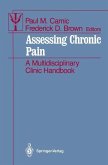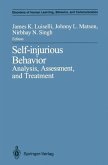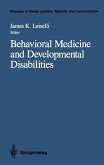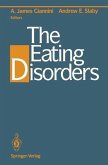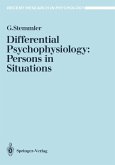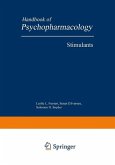Panic and Phobias 2 (eBook, PDF)
Treatments and Variables Affecting Course and Outcome
Redaktion: Hand, Iver; Wittchen, Hans-Ulrich
73,95 €
73,95 €
inkl. MwSt.
Sofort per Download lieferbar

37 °P sammeln
73,95 €
Als Download kaufen

73,95 €
inkl. MwSt.
Sofort per Download lieferbar

37 °P sammeln
Jetzt verschenken
Alle Infos zum eBook verschenken
73,95 €
inkl. MwSt.
Sofort per Download lieferbar
Alle Infos zum eBook verschenken

37 °P sammeln
Panic and Phobias 2 (eBook, PDF)
Treatments and Variables Affecting Course and Outcome
Redaktion: Hand, Iver; Wittchen, Hans-Ulrich
- Format: PDF
- Merkliste
- Auf die Merkliste
- Bewerten Bewerten
- Teilen
- Produkt teilen
- Produkterinnerung
- Produkterinnerung

Bitte loggen Sie sich zunächst in Ihr Kundenkonto ein oder registrieren Sie sich bei
bücher.de, um das eBook-Abo tolino select nutzen zu können.
Hier können Sie sich einloggen
Hier können Sie sich einloggen
Sie sind bereits eingeloggt. Klicken Sie auf 2. tolino select Abo, um fortzufahren.

Bitte loggen Sie sich zunächst in Ihr Kundenkonto ein oder registrieren Sie sich bei bücher.de, um das eBook-Abo tolino select nutzen zu können.
- Geräte: PC
- ohne Kopierschutz
- eBook Hilfe
- Größe: 46.75MB
Andere Kunden interessierten sich auch für
![Assessing Chronic Pain (eBook, PDF) Assessing Chronic Pain (eBook, PDF)]() Assessing Chronic Pain (eBook, PDF)73,95 €
Assessing Chronic Pain (eBook, PDF)73,95 €![Self-injurious Behavior (eBook, PDF) Self-injurious Behavior (eBook, PDF)]() Self-injurious Behavior (eBook, PDF)73,95 €
Self-injurious Behavior (eBook, PDF)73,95 €![Behavioral Medicine and Developmental Disabilities (eBook, PDF) Behavioral Medicine and Developmental Disabilities (eBook, PDF)]() Behavioral Medicine and Developmental Disabilities (eBook, PDF)40,95 €
Behavioral Medicine and Developmental Disabilities (eBook, PDF)40,95 €![A Solution to the Riddle Dyslexia (eBook, PDF) A Solution to the Riddle Dyslexia (eBook, PDF)]() H. N. LevinsonA Solution to the Riddle Dyslexia (eBook, PDF)40,95 €
H. N. LevinsonA Solution to the Riddle Dyslexia (eBook, PDF)40,95 €![The Eating Disorders (eBook, PDF) The Eating Disorders (eBook, PDF)]() The Eating Disorders (eBook, PDF)40,95 €
The Eating Disorders (eBook, PDF)40,95 €![Differential Psychophysiology: Persons in Situations (eBook, PDF) Differential Psychophysiology: Persons in Situations (eBook, PDF)]() Gerhard StemmlerDifferential Psychophysiology: Persons in Situations (eBook, PDF)40,95 €
Gerhard StemmlerDifferential Psychophysiology: Persons in Situations (eBook, PDF)40,95 €![Stimulants (eBook, PDF) Stimulants (eBook, PDF)]() Stimulants (eBook, PDF)73,95 €
Stimulants (eBook, PDF)73,95 €-
-
-
Produktdetails
- Verlag: Springer Berlin Heidelberg
- Seitenzahl: 275
- Erscheinungstermin: 6. Dezember 2012
- Englisch
- ISBN-13: 9783642735431
- Artikelnr.: 53092350
Dieser Download kann aus rechtlichen Gründen nur mit Rechnungsadresse in A, B, BG, CY, CZ, D, DK, EW, E, FIN, F, GR, HR, H, IRL, I, LT, L, LR, M, NL, PL, P, R, S, SLO, SK ausgeliefert werden.
- Herstellerkennzeichnung Die Herstellerinformationen sind derzeit nicht verfügbar.
I: Psychological or Biological Treatments of Panic and Phobias: Current State of the Controversy.- 1. Natural Course and Spontaneous Remissions of Untreated Anxiety Disorders: Results of the Munich Follow-up Study (MFS).- 2. Biology and Pharmacological Treatment of Panic Disorder.- 3. The Mutually Potentiating Effects of Imipramine and Exposure in Agoraphobia.- II: Pharmacological, Cognitive, and Behavioral Treatment of Panic and Phobias: Current State of Research.- 4. Effects of Discontinuation of Antipanic Medication.- 5. Comparison of Alprazolam and Cognitive Behavior Therapy in the Treatment of Panic Disorder: A Preliminary Report.- 6. Cognitive-Behavioral Treatment of Panic.- 7. Cognitive Factors in the Treatment of Anxiety States.- 8. Long-Term Efficacy of Ungraded Versus Graded Massed Exposure in Agoraphobia.- 9. Exposure Treatment of Agoraphobia with Panic Attacks: Are Drugs Essential?.- III: Specific Variables Affecting Mode of Treatment: Experimental Studies on Physiology and Cognition.- 10. Panic Attacks in Nonclinical Subjects.- 11. Panic, Perception, and pCO2.- 12. Selective Information Processing, Interoception, and Panic Attacks.- 13. Tests of a Cognitive Theory of Panic.- 14. What Cognitions Differentiate Panic Disorder from Other Anxiety Disorders?.- 15. Factors Relevant to Lactate Response in Panic Disorder.- 16. Do Anxiety Patients Differ in Autonomic Base Levels and Stress Response from Normal Controls?.- 17. Comorbidity of Panic Disorder and Major Depression: Results from a Family Study.- 18. Anxiety and Sensitization: A Neuropsychological Approach.- IV: Specific Variables Affecting Treatment Outcome of Anxiety Disorders: Clinical, Psychosocial, and Interactional Factors.- 19. Failures in Exposure Treatment of Agoraphobia: Evaluation and Prediction.- 20. Prediction of Outcome Following In Vivo Exposure Treatment of Agoraphobia.- 21. Intra- and Interpersonal Characteristics Predictive of Long-Term Outcome Following Behavioral Treatment of Obsessive-Compulsive Disorders.- 22. Martial Quality and Treatment Outcome in Anxiety Disorders.- 23. Patterns of Patient-Spouse Interaction in Agoraphobics: Assessment by Camberwell Family Interview (CFI) and Impact on Outcome of Self-Exposure Treatment.- Epilogue:.- Overview: Towards Integration in Panic and Phobias.
I: Psychological or Biological Treatments of Panic and Phobias: Current State of the Controversy.- 1. Natural Course and Spontaneous Remissions of Untreated Anxiety Disorders: Results of the Munich Follow-up Study (MFS).- 2. Biology and Pharmacological Treatment of Panic Disorder.- 3. The Mutually Potentiating Effects of Imipramine and Exposure in Agoraphobia.- II: Pharmacological, Cognitive, and Behavioral Treatment of Panic and Phobias: Current State of Research.- 4. Effects of Discontinuation of Antipanic Medication.- 5. Comparison of Alprazolam and Cognitive Behavior Therapy in the Treatment of Panic Disorder: A Preliminary Report.- 6. Cognitive-Behavioral Treatment of Panic.- 7. Cognitive Factors in the Treatment of Anxiety States.- 8. Long-Term Efficacy of Ungraded Versus Graded Massed Exposure in Agoraphobia.- 9. Exposure Treatment of Agoraphobia with Panic Attacks: Are Drugs Essential?.- III: Specific Variables Affecting Mode of Treatment: Experimental Studies on Physiology and Cognition.- 10. Panic Attacks in Nonclinical Subjects.- 11. Panic, Perception, and pCO2.- 12. Selective Information Processing, Interoception, and Panic Attacks.- 13. Tests of a Cognitive Theory of Panic.- 14. What Cognitions Differentiate Panic Disorder from Other Anxiety Disorders?.- 15. Factors Relevant to Lactate Response in Panic Disorder.- 16. Do Anxiety Patients Differ in Autonomic Base Levels and Stress Response from Normal Controls?.- 17. Comorbidity of Panic Disorder and Major Depression: Results from a Family Study.- 18. Anxiety and Sensitization: A Neuropsychological Approach.- IV: Specific Variables Affecting Treatment Outcome of Anxiety Disorders: Clinical, Psychosocial, and Interactional Factors.- 19. Failures in Exposure Treatment of Agoraphobia: Evaluation and Prediction.- 20. Prediction of Outcome Following In Vivo Exposure Treatment of Agoraphobia.- 21. Intra- and Interpersonal Characteristics Predictive of Long-Term Outcome Following Behavioral Treatment of Obsessive-Compulsive Disorders.- 22. Martial Quality and Treatment Outcome in Anxiety Disorders.- 23. Patterns of Patient-Spouse Interaction in Agoraphobics: Assessment by Camberwell Family Interview (CFI) and Impact on Outcome of Self-Exposure Treatment.- Epilogue:.- Overview: Towards Integration in Panic and Phobias.

